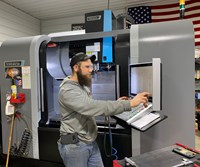Retired Machinists in a Contingency Staffing Role?
Temporary hiring of retired machinists can enable shops to quickly and easily change capacity when business ebbs and flows.
Senior Editor Matt Danford’s article “Skills Training Strenghens Shops, Communities” describes one idea to help cultivate a pool of machining and manufacturing talent. It describes the efforts by the Jane Addams Resource Corp. (JARC) to teach low-income adults in the Chicago, Illinois, area the skills they need to establish manufacturing careers. That organization also aims to connect those trained individuals with the manufacturers in need of their talents, making it a win-win for both parties.
This article is one of many we’ve written to address workforce development and employee training. In fact, we recently added another that proposes an idea to help shops more effectively maintain appropriate staffing levels both when business is good and when it’s bad: temporary hiring of retired machinists.
Larry Larson wrote this article and sent it to me. He is a retired manager of a precision machining prototype job shop and director of engineering for a major electronics test and measurement equipment company. His article points out that a temporary-hiring situation enables retired machinists to contribute to the success of a machining business while still meeting their personal retirement goals. Among other benefits he cites, the cost to employ these workers is variable. When the demand drops off, it is easy to reduce expenses by not employing them. However, they know when the demand increases again, they will be called back.
Mr. Larson advises shops to encourage retired employees to join a temporary staffing agency. That way, they’re just a phone call away. Joe Lampinen agrees. The senior director of engineering and global practice consultant for Kelly Outsourcing and Consulting Group says machine shops can benefit from practicing talent supply chain management.
“This is a holistic, total workforce approach to attracting and engaging talent with the right skills in a variety of ways, including full-time regular employees and various forms of contingent workers, which can include temporary employees, freelancers and independent contractors,” he explains. “Many companies tailor their workforces by blending regular employees with contingent workers to meet changes in workload and demand for special skills. Retirees can provide an important source of skilled machinists, as well as fill other roles in manufacturing and skilled maintenance. In fact, retirees are an important segment of the candidate market at KellyOCG.”
What say you? This strategy doesn’t necessarily build a pipeline of new talent. However, it might be an attractive option, especially for small operations to maintain a right-sized staff. Plus, existing young employees are sure to learn a thing or two by spending time with machining veterans.
Related Content
-
In Moldmaking, Mantle Process Addresses Lead Time and Talent Pool
A new process delivered through what looks like a standard machining center promises to streamline machining of injection mold cores and cavities and even answer the declining availability of toolmakers.
-
A Career at the Top Helps Rebuild a Job Shop
A new approach to management propels expansion into Swiss-type and multitasking machining work.
-
Will the “Great Resignation” Become an Opportunity for Manufacturers? Get Ready for the Returning 3 Million
The Great Resignation will become a Great Reapplication when employees currently able to stay out of the workforce return to it looking for something better. Machining employers that are already evaluating candidates for fit, without demanding specific skills coming in, might be positioned well to draw upon this wave.

.jpg;width=70;height=70;mode=crop)














